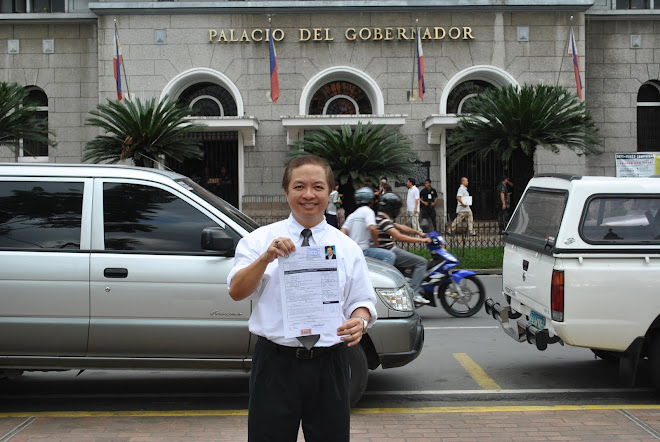Tuesday, October 21, 2008
Uncontrolled corruption
DPI, Editorial
It is not just a perception, it is the reality: The Philippines is one of the world’s most corrupt nations.
That is according to Justin Wood, director of the Southeast Asia Corporate Network of The Economist Intelligence Unit. “The Philippines is perceived as one of the most corrupt countries in the world,” Wood told the Business Roundtable in Makati City earlier this month, citing the results of the latest survey on corruption done by Transparency International. “The perception is very correct.”
In Transparency International’s latest Corruption Perception Index, the Philippines was way down at 141 among the 180 countries surveyed. Its score of 2.3 (on a scale where 10 means perfectly clean), the lowest it has received since the survey was started in 1995, put the Philippines behind all of its neighbors in Southeast Asia.
Not surprisingly, President Gloria Macapagal-Arroyo disagrees. She told the same meeting that the perception of widespread corruption was the media’s creation. The people surveyed by Transparency International based their answers on what they read in the newspapers, she said, adding: “We have to remember that we have the freest media in the region... What would be on page 10 in some other countries would be banner headline in the Philippines. Even rumors and innuendos become fact when they are in the banner headline.”
But is corruption in the Philippines largely a figment of the imagination, as the President would like everyone to believe? Ms Arroyo herself seemed to implicitly acknowledge that there is (or was) a problem when she accepted a $21-million grant from the World Bank to fund programs to fight corruption. The Philippines Threshold Program, which was approved in 2006, was meant to strengthen the anti-corruption efforts of the Office of the Ombudsman and Department of Finance. Not only did the government accept the grant, it even matched the amount it got from the World Bank.
But with the program coming to an end in November, the World Bank has been forced to admit that it has been a dismal failure. In fact, during the two years the program has been running, “control of corruption” by the Philippine government was actually deteriorating. Thus, while the Philippines had a “control of corruption” score that was in the 76th percentile in 2006, this went down to the 57th percentile in 2007 and further down to the 47th percentile this year.
This was the first time the Philippines flunked the “control of corruption” indicator, prompting the World Bank to question the effectiveness of its threshold programs in combating corruption. In addition, this poor performance has virtually disqualified the country from availing itself of further grants from the Millennium Challenge Corp. “Control of corruption” is the only “hard hurdle” a country must pass to be eligible for funding assistance from the Millennium Challenge.
It is surely not just a coincidence that these independent findings about worsening corruption came at time when new and bigger corruption scandals, involving the country’s highest officials, erupted.
There was the NorthRail project and the National Broadband Network contract, to mention just two of them. These were not issues manufactured by the media. And if they became banner stories, it was not because the media wanted to sensationalize them. They were scandals of mind-boggling proportions, dwarfing other news in importance and impact.
But who cares if programs to combat corruption fail? The crooks in government are happiest to see anti-corruption drives falter, because they can continue their corrupt ways without fear of being caught and punished. And there are many of them in high and low places.
People who keep hoping for clean and honest government that uses taxpayers’ money wisely and well will have to wait for another administration. The President thinks corruption is not a problem or at least not the serious problem businessmen and other observers take it to be. Nothing, not even neutral surveys and studies, will change her mind. It would be pointless and futile to look up to her for a solution.
It is not just a perception, it is the reality: The Philippines is one of the world’s most corrupt nations.
That is according to Justin Wood, director of the Southeast Asia Corporate Network of The Economist Intelligence Unit. “The Philippines is perceived as one of the most corrupt countries in the world,” Wood told the Business Roundtable in Makati City earlier this month, citing the results of the latest survey on corruption done by Transparency International. “The perception is very correct.”
In Transparency International’s latest Corruption Perception Index, the Philippines was way down at 141 among the 180 countries surveyed. Its score of 2.3 (on a scale where 10 means perfectly clean), the lowest it has received since the survey was started in 1995, put the Philippines behind all of its neighbors in Southeast Asia.
Not surprisingly, President Gloria Macapagal-Arroyo disagrees. She told the same meeting that the perception of widespread corruption was the media’s creation. The people surveyed by Transparency International based their answers on what they read in the newspapers, she said, adding: “We have to remember that we have the freest media in the region... What would be on page 10 in some other countries would be banner headline in the Philippines. Even rumors and innuendos become fact when they are in the banner headline.”
But is corruption in the Philippines largely a figment of the imagination, as the President would like everyone to believe? Ms Arroyo herself seemed to implicitly acknowledge that there is (or was) a problem when she accepted a $21-million grant from the World Bank to fund programs to fight corruption. The Philippines Threshold Program, which was approved in 2006, was meant to strengthen the anti-corruption efforts of the Office of the Ombudsman and Department of Finance. Not only did the government accept the grant, it even matched the amount it got from the World Bank.
But with the program coming to an end in November, the World Bank has been forced to admit that it has been a dismal failure. In fact, during the two years the program has been running, “control of corruption” by the Philippine government was actually deteriorating. Thus, while the Philippines had a “control of corruption” score that was in the 76th percentile in 2006, this went down to the 57th percentile in 2007 and further down to the 47th percentile this year.
This was the first time the Philippines flunked the “control of corruption” indicator, prompting the World Bank to question the effectiveness of its threshold programs in combating corruption. In addition, this poor performance has virtually disqualified the country from availing itself of further grants from the Millennium Challenge Corp. “Control of corruption” is the only “hard hurdle” a country must pass to be eligible for funding assistance from the Millennium Challenge.
It is surely not just a coincidence that these independent findings about worsening corruption came at time when new and bigger corruption scandals, involving the country’s highest officials, erupted.
There was the NorthRail project and the National Broadband Network contract, to mention just two of them. These were not issues manufactured by the media. And if they became banner stories, it was not because the media wanted to sensationalize them. They were scandals of mind-boggling proportions, dwarfing other news in importance and impact.
But who cares if programs to combat corruption fail? The crooks in government are happiest to see anti-corruption drives falter, because they can continue their corrupt ways without fear of being caught and punished. And there are many of them in high and low places.
People who keep hoping for clean and honest government that uses taxpayers’ money wisely and well will have to wait for another administration. The President thinks corruption is not a problem or at least not the serious problem businessmen and other observers take it to be. Nothing, not even neutral surveys and studies, will change her mind. It would be pointless and futile to look up to her for a solution.
Subscribe to:
Post Comments (Atom)










No comments:
Post a Comment